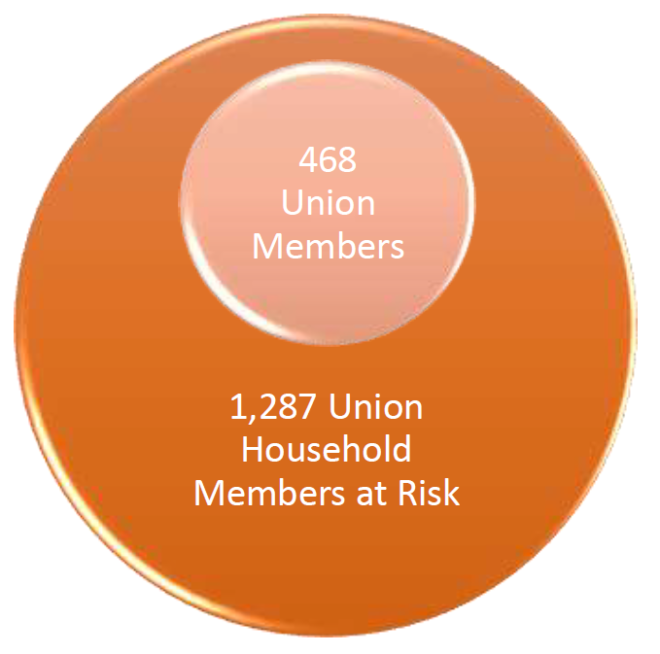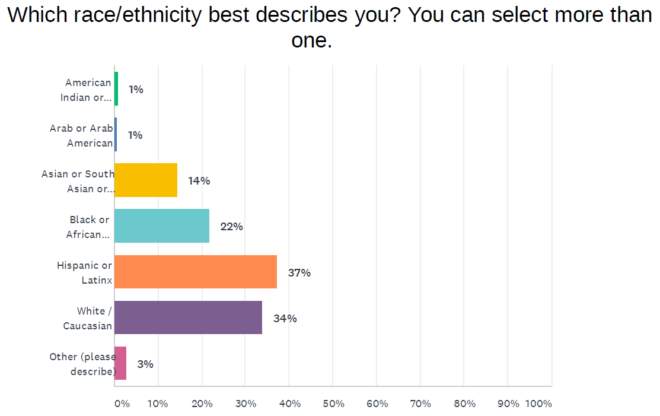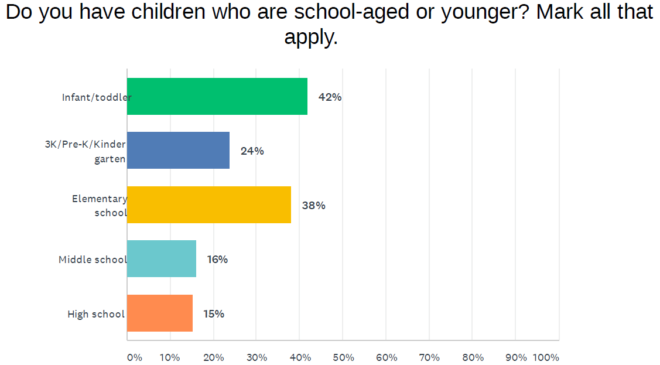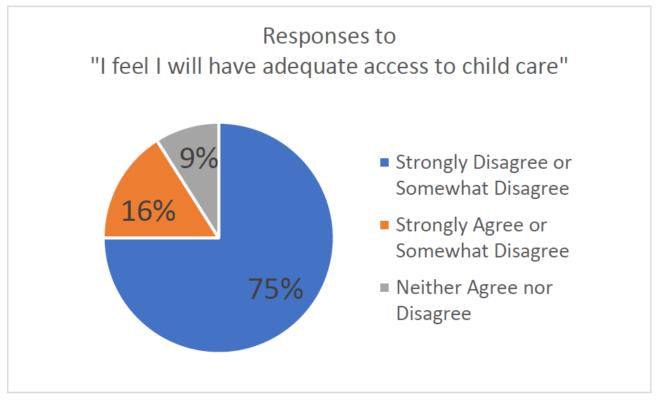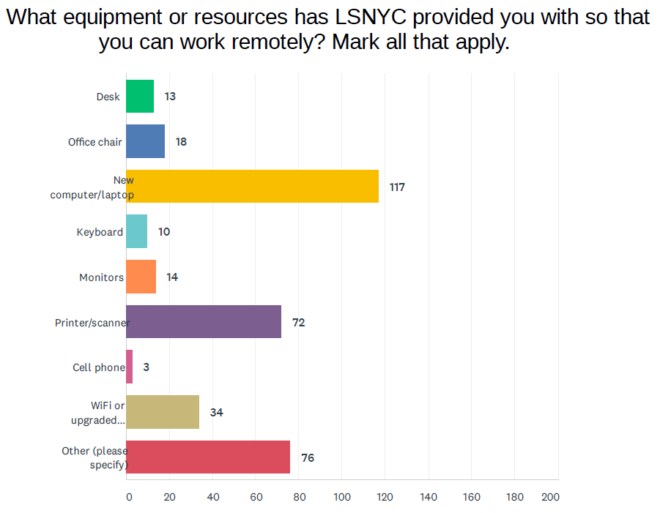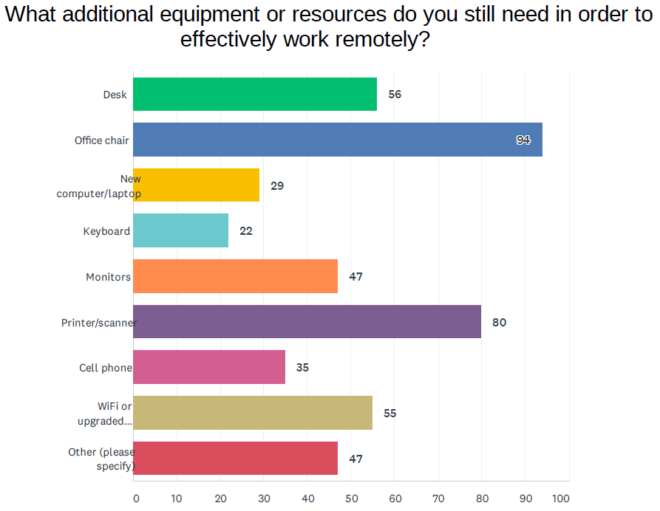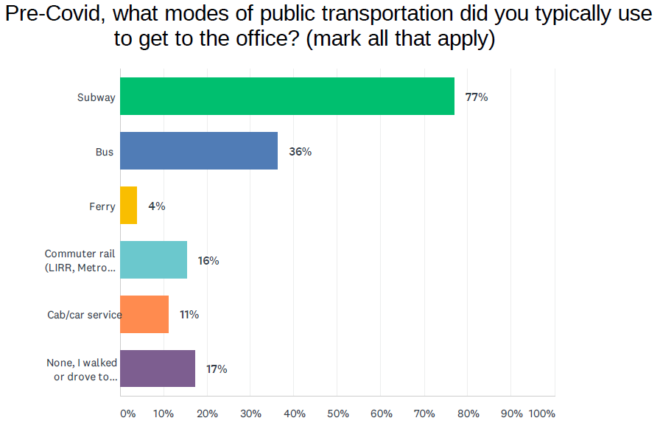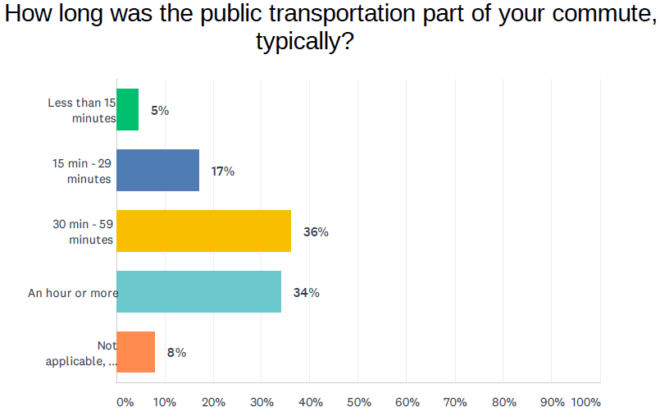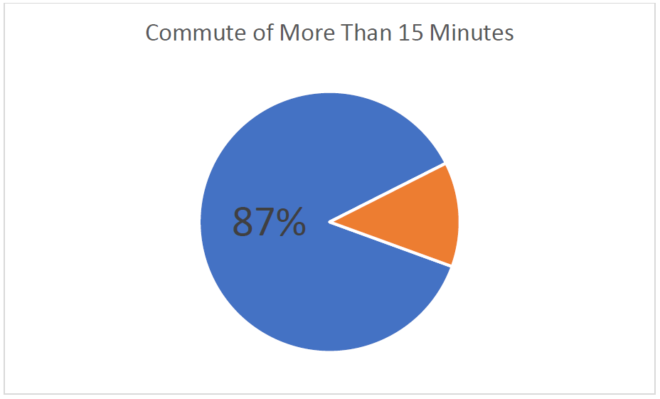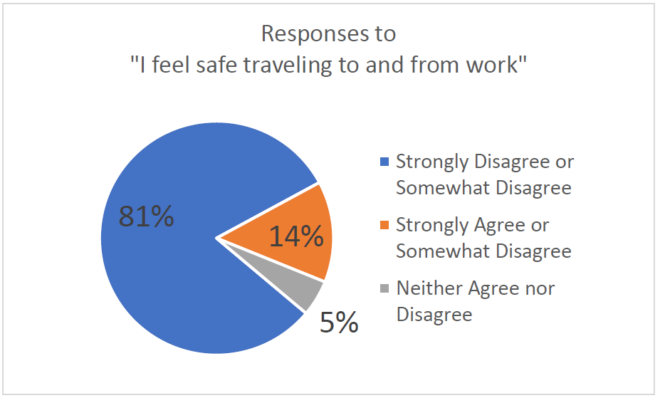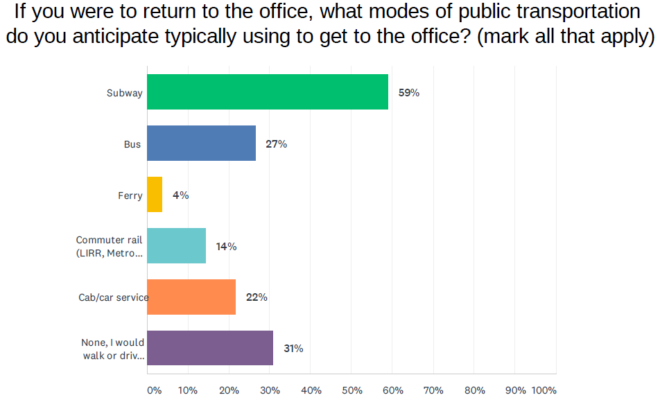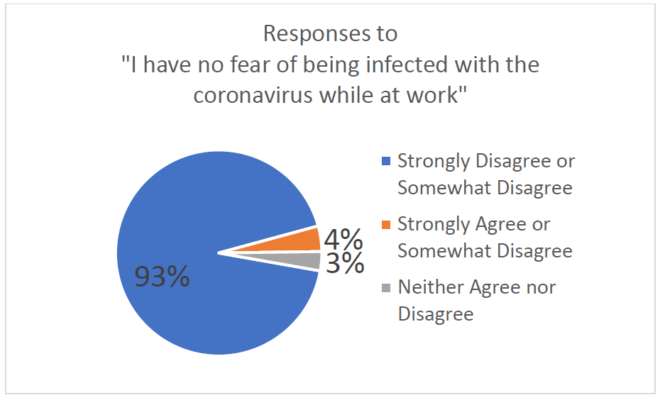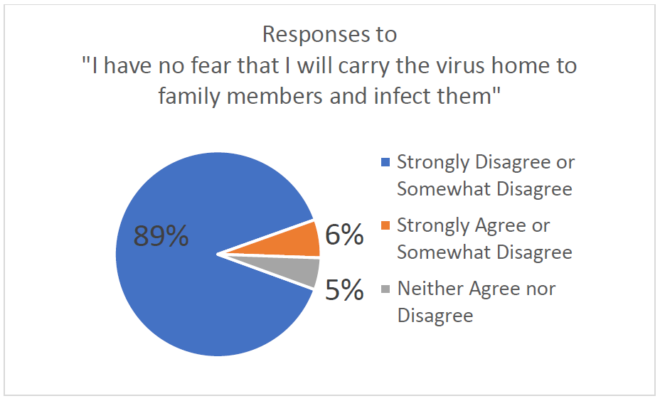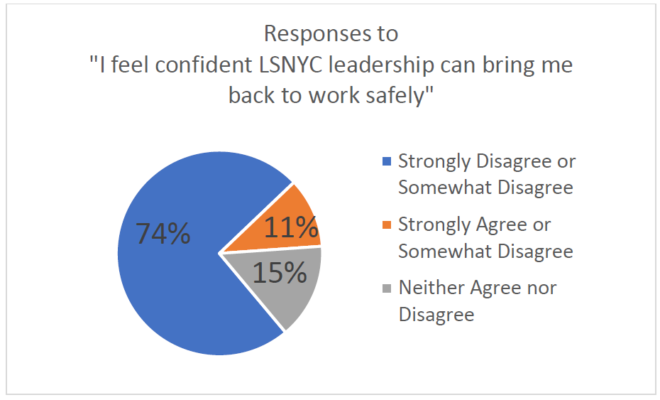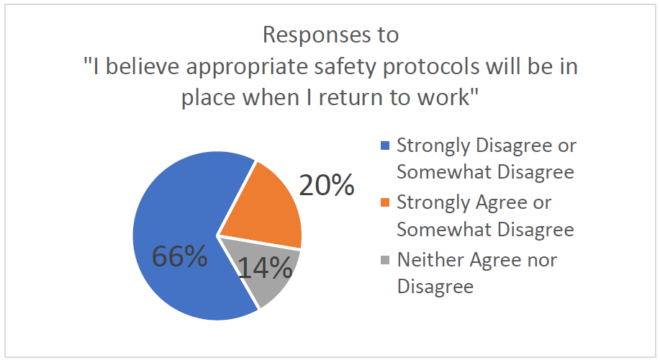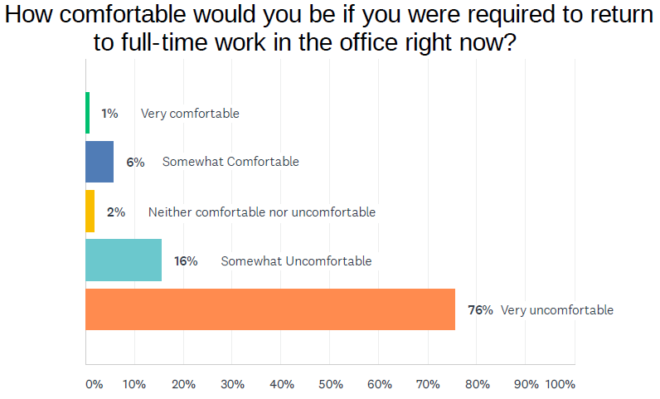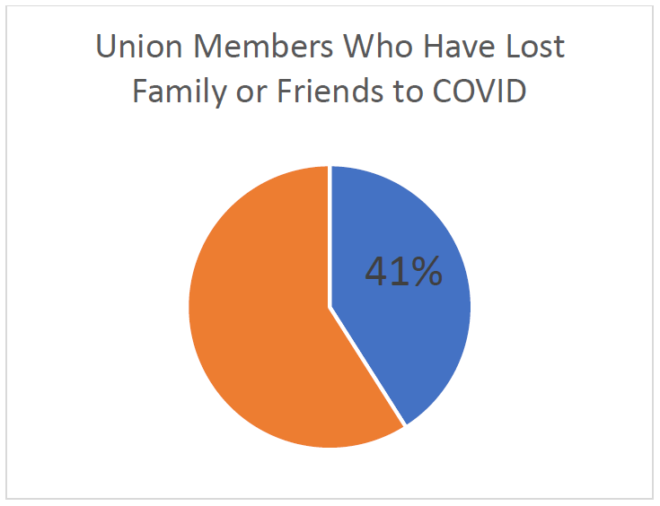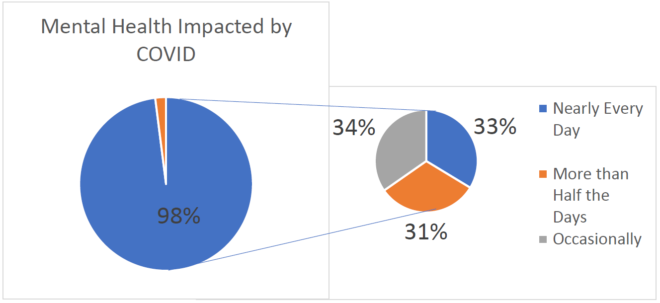November 2020
The Legal Services Staff Association represents 468 union members at Legal Services NYC (LSNYC). In August 2020 we surveyed our members to learn more about how COVID has impacted themselves and their families, and about their concerns regarding COVID and the workplace. Of our 468 LSNYC union members, 364 responded to our survey, a response rate of 78%.
Our Households
The vast majority of our LSNYC union members – 86% – live in households with others, with only 14% of our members living alone.
Our union members have an average of 2.75 people in each household. This means that if our 468 LSNYC union members are forced into unsafe environments, 1,287 people will be at direct risk.
Our Membership
Our union has a racially diverse membership, with 37% of our LSNYC members reporting they are Latinx/Hispanic, 34% white/Caucasian, 22% Black/African American/African-Descent, and 14% Asian/South Asian/Pacific Islander.
Children and Childcare Concerns
105 respondents have children in their household who are high school–aged or younger.
Of these union members with school-aged or younger children, 27% ranked child care as their number one concern, and 15% ranked child care as their number two concern.
75% of union members with school-aged or younger children said they either strongly disagreed or somewhat disagreed with the statement “I feel I will have adequate access to child care.” Only 16% strongly agreed or somewhat agreed with the statement.
Working Remotely
To support staff in working remotely, LSNYC has provided a diverse range of equipment, from new computers to printers to office chairs to WiFi or upgraded internet.
As the pandemic has continued, there remain unfulfilled needs that will allow staff to successfully and effectively work remotely. Chief among these are the need for office chairs and printer/scanners.
Transportation, Pre-Covid and Now
Because we are based in New York City, the vast majority of our LSNYC union members have typically relied on public transportation to travel to and from the job. Pre-COVID, 77% of members took the subway to work, 36% took the bus, 15% commuter rail, and 4% a ferry. 17% reported they either walked or drove themselves to the office, and 11% typically took a cab or car service.
Most of our LSNYC union members have long commutes. 87% report that their commute on public transportation is longer than 15 minutes, with 36% commuting between half an hour to an hour, and 34% commuting on public transportation for more than an hour.
Even short commutes can put workers at risk of significant exposure to COVID-19. The CDC uses a guideline of 15 minutes as an operational definition of “prolonged exposure,” which puts a person at risk of infection (https://www.cdc.gov/coronavirus/2019-ncov/php/public-health-recommendations.html). Virtually all of our union members commute for that length of time or more every day.
Union members are concerned about their safety getting to and from work. A large majority, 81%, said they either strongly disagreed or somewhat disagreed with the statement “I feel safe traveling to and from work.” Only 14% strongly agreed or somewhat agreed with the statement.
Many union members anticipate commuting to work differently once they return to the office. Only 59% rather than 77% anticipate continuing to use the subway, and only 27% rather than 36% anticipate using the bus. Those who anticipate walking or driving themselves rises from 17% to 31%, and those who anticipate using a cab or car services doubles from 11% to 22%.
Member Concerns about COVID and the Workplace
Our union members are tremendously and understandably fearful of being infected with COVID at work.
A vast majority, 93%, said they either strongly disagreed or somewhat disagreed with the statement “I have no fear of being infected with the coronavirus while at work.”
Not surprisingly, union members fear bringing COVID home and infecting their family members. Another large majority, 89%, said they either strongly disagreed or somewhat disagreed with the statement “I have no fear that I will carry the virus home to family members and infect them.” Only 6% strongly agreed or somewhat agreed with the statement.
Our union members do not have confidence in LSNYC leadership to bring us back to work safely. A strong majority of 74% said they either strongly disagreed or somewhat disagreed with the statement “I feel confident LSNYC leadership can bring me back to work safely.” Only 11% strongly agreed or somewhat agreed with the statement.
This lack of confidence in the employer extends to health and safety experts selected by the employer. Inspection of the courts and the offices by a union-vetted health and safety expert was an important component in giving union members confidence about the condition of those venues. While only 35% of members had confidence in an expert selected only by the employer, 54% would have confidence in a union-vetted health and safety expert. This finding affirms Legal Services NYC’s decision to partner with the union to jointly select a health and safety expert, and underscores the need to have that expert inspect the courts and other forums where our members appear.
A majority of union members—66%—said they either strongly disagreed or somewhat disagreed with the statement “I believe appropriate safety protocols will be in place when I return to work.” Only 20% strongly agreed or somewhat agreed with the statement.
Another large majority of union members—92%—reported they would be very or somewhat uncomfortable if required to return to full-time work in the office right now (August 2020). Only 7% reported they would feel very or somewhat comfortable.
To address staff member concerns and repair the lack of trust regarding safe working conditions, we urge Legal Services NYC to work collaboratively and transparently with the union, its members, and a professional industrial hygienist to:
- Assess all offices, courts, and forums in which staff work;
- Remedy any unsafe conditions and implement all necessary measures and modifications to protect the safety of staff and clients;
- Share information and practice transparency regarding safety conditions in LSNYC offices and offsite locations where LSNYC employees perform work;
- Allow full remote work flexibility for all employees with all necessary supports and equipment;
- Implement a respiratory protection program, including control banding and provision of the highest level of personal protective equipment (PPE) for employees and clients;
- Set strict office occupancy limits and scheduling of employee and client visits based on office space, configuration, ventilation, and best industrial-hygiene practices;
- Create and maintain emergency shutdown procedures in the event of SARS-CoV-2 transmission in any office or location where LSNYC employees perform work;
- Retain an independent industrial hygienist to continually monitor office and building systems, policies, protocols, and procedures related to COVID-19;
- Engage in any and all other measures necessary to further the safety of LSNYC’s employees, clients, and surrounding communities.
Loss, Trauma, and Mental Health
Our union members have experienced tremendous loss, trauma, and instability because of COVID.
41% have lost a family member or friend due to COVID, and 6% (as of August 2020) had themselves been infected with COVID.
29% report that a household member lost their source of income due to the pandemic, while 21% are acting as a caregiver for another person in a way they did not have to prior to COVID.
An overwhelming 98% of union members report that COVID has impacted their mental health: 33% reported that COVID has impacted their mental health nearly every day, 31% reported more than half the days, and 34% responded that COVID occasionally impacts their mental health.
Conclusion
The results of our survey make clear that the vast majority of LSNYC’s union members have significant and well-founded concerns regarding a return to in-person work during the COVID-19 pandemic. They fear for their own health. They fear for the health of their households and families. They also fear that LSNYC will not take the necessary safety precautions to protect staff, clients, and the broader community as demonstrated by the stark lack of confidence in LSNYC leadership. LSNYC must work both to ensure the safety of its employees and clients, and to build trust among its staff that the employer values their safety and is taking all necessary steps to ensure it.
